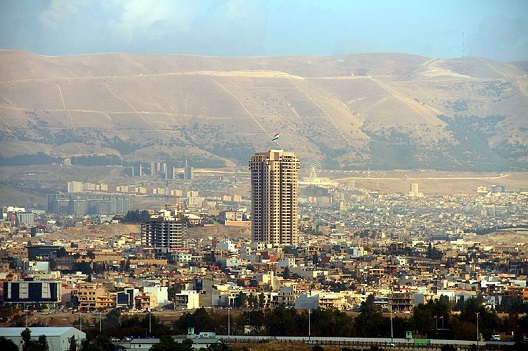 Increased calls from the Iraqi army to the United States to provide promised F-16 fighter jets and Apache helicopters are aimed at destroying the Iraqi offshoot of al-Qaeda in Sunni heartland of Iraq. However, the Iraqi army’s fight against Sunni insurgents rather than increased border protection raises worries among Kurds that the Iraqi army could resume the fight against them, as they did in 1970s and 1980s.
Increased calls from the Iraqi army to the United States to provide promised F-16 fighter jets and Apache helicopters are aimed at destroying the Iraqi offshoot of al-Qaeda in Sunni heartland of Iraq. However, the Iraqi army’s fight against Sunni insurgents rather than increased border protection raises worries among Kurds that the Iraqi army could resume the fight against them, as they did in 1970s and 1980s.
March 16 marked the twenty-sixth anniversary of Halabja’s 1988 poison attack by the Iraqi air force that killed 5,000 Kurds, with the US embassy in Baghdad releasing a statement promising the Iraqi security forces effective weaponry to fight the Islamic State of Iraq and the Levant (ISIL). The Iraqi Kurds received the message with surprise.
“It would have been much better to issue a statement to show solidarity with the Kurdish people on Halabja anniversary,” said Falah Mustafa Bakir, the chief of foreign relations of the Kurdistan Regional Government (KRG), based in Erbil, the capital of the Kurdistan region of Iraq.
In March, the Iraqi government cut salaries for Iraqi Kurds trying to export oil through a new pipeline to Turkey. The Kurds want economic independence from Baghdad by exporting their own oil through Turkey. Baghdad, however, sees this is as illegal and fearing this move towards oil independence could open the way for the fragmentation of Iraq. The Kurds have the capacity to export oil to Turkey, but so far failed to sell it.
Bakir says Baghdad’s measures show that the Iraqi government still wants to control the Kurds. “The salary issue is proof that Baghdad has not changed. So people have more worries than before. How did they handle the situation in Anbar? It could have been handled in a much proper way. It just started over a year ago before 2012. It was not about terrorists, but people going on the streets and asking for demands.”
Instead, Maliki used the Iraqi army to crush the protests in Anbar that called for better treatment of Sunni Arabs in Iraq. “We have been asking guarantees from the United States [for the weapons not to be used against Kurds]. Because if you talk to the people in Anbar, they will tell you, if this is an Iraqi army, or a sectarian army? How can sophisticated weapons be given to an Iraqi army heavily involved in internal differences?”
There have been dangerous stand-offs between the Iraqi army, and the Kurdish Peshmerga forces before in the territorially disputed areas between Baghdad, and the Kurds since 2011. Just as there has been no final agreement yet on the oil law, Erbil and Baghdad also cannot agree on what to do with disputed areas inhabited by Kurds—one more legacy of the US failure to solve this issue before their withdrawal in 2011.
Before 2011, the United States managed to prevent tensions from escalating between Kurds and the Iraqi army. Nevertheless, the Kurds managed to prevented Iraqi army advances in Kirkuk and Mosul after the withdrawal due to of the army’s lack of cohesiveness and desertions. Well-disciplined Kurdish forces still manage to keep the Iraqi forces at bay. So far, with the Iraqi army locked down in Anbar, the Kurds do not fear any future threat.
However, the Kurds fear this standoff could change if the Iraqi army would receive heavy weapons. According to a RAND report in 2010, the Iraqi army could potentially defeat Kurdish forces in 2015. The Kurdish army, the Peshmerga, does not receive a share of the heavy weapons purchased by the Iraqi army, although they do obtain small arms and ammunition from other countries.
In 2012, the KRG president Masoud Barzani revealed details that Iraqi Prime Minister Nouri al-Maliki discussed using F-16s against Kurdistan in a military meeting. The KRG quietly lobbied Europe and the United States against heavily arming the Iraqi army, pointing out human rights abuses and the mismanagement of the situation in Anbar. But the United States increasingly looks at Iraq from a counterterrorism point of view with little regard to the potential fallout for the Kurdish community, officials fear.
Professor Gareth Stansfield, giving oral evidence on May 6 in the UK House of Commons, confirms this fear among Kurds for the future:
But Lukman Faily, the Iraqi ambassador in Washington, asserts that the Iraqi government would not use arms against the Kurds, despite past confrontations:
The air monopoly by Baghdad might lead the Kurds to seek a Turkish security guarantee, if the United States fails to prevent the Iraqi army from acquiring heavy weapons or give the Kurds a security guarantee.
It seems unlikely, however, that Turkish jets would protect the Kurds in a scenario in which Baghdad uses F-16s against the Kurds.Kurds could approach other regional powers, cut off oil pipelines, or disrupt the water supply to Iraq.Kurdish anxiety over their own security will not likely dissipate so long as the Western focus on counterterrorism disrupts the balance of power on the ground. The West’s single-minded focus on security may lead to the very insecurity it hopes to avoid.
The KRG Prime Minister Nechirvan Barzani warned, “We have a door of hope, which is Turkey. And if that door, that hope is closed, it will be Impossible for us to surrender to Baghdad. We will do something that will put in danger the interests of all those concerned.”
Wladimir van Wilgenburg is an analyst of Kurdish politics for the Jamestown Foundation and a contributing writer for Al-Monitor.
Image: The city of Sulaimaniya in Iraqi Kurdistan. (Photo: Wikimedia)
